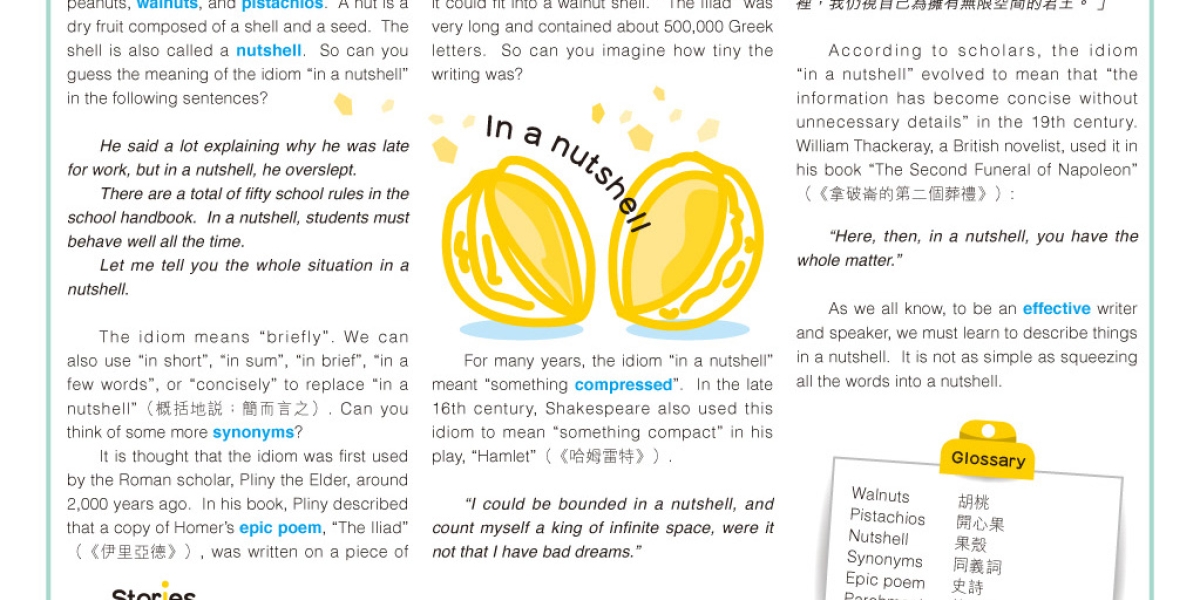昔日文章


Stories behind Idioms
2015.12.05
In the nick of time
With the use of a dictionary, how many different meanings can you find for the word “nick”? You might be able to find out at least three different uses for this word. Its most basic meaning is “a small cut or notch”:
The accident has left a nick(切痕)on her arm.
In informal British English, it means “prison” or “police station”:
The murderer has been in the nick(監獄) for many years.
The robber was arrested and taken to the nick(警察局) for further investigation.
If we capitalise the first alphabet of the word, then “Nick” will become a short form for the male name “Nicholas”. Beware, “Old Nick” is an informal name of the devil.
Which of the above meanings of “nick” do you think is most related to the idiom “in the nick of time” in the following sentence?
The man arrived at the station in the nick of time(正好及時)to catch the train.
The idiom means “just in time” or “at the last minute”. Scholars think that the idiom developed from an old meaning “at the precise or critical moment” in the 16th century. The nick was a notch or a precise marker carved in wood to keep a tally or a record. So the phrase “in the nick” was used to express “at the precise moment”. However, this meaning has become obsolete nowadays.
Later, speakers of English wanted to make the meaning clearer. So they added “of time” to it to mean “at the last minute”. Some people also add “very” to emphasise the last possible moment that something happens. For example:
John was lucky enough to arrive at the exam centre in the very nick of time. Otherwise, he would have missed the exam.
A number of books and films entitled “Nick of Time” or “The Nick of Time” have been produced to tell exciting stories about crime and spying. Have you ever read or watched any of them?


Vocabulary Building Time
2015.12.05
Covers
When we sneeze we cover our nose with tissue; when we buy a book we wrap it up in a plastic cover.
Covers are for protection, keeping something clean, warm, or safe from damage. Sometimes we cover up for secrecy if we don’t want anything to be seen by others.
What are some of the ordinary covers around your house? Are the following ones familiar to you?
Table-cloths come in different shapes to suit the furniture: round, square or rectangular.
This bedspread makes a pretty set with the flowery bed sheet and pillow case.
With a broken lid, the pot is of little use.
Our eyes will feel more comfortable if there is a lampshade over the light.
The awning protected John from the rain as he stood outside the door.


Stories behind Idioms
2015.11.28
In a nutshell
A lot of us love eating nuts such as peanuts, walnuts, and pistachios. A nut is a dry fruit composed of a shell and a seed. The shell is also called a nutshell. So can you guess the meaning of the idiom “in a nutshell” in the following sentences?
He said a lot explaining why he was late for work, but in a nutshell, he overslept.
There are a total of fifty school rules in the school handbook. In a nutshell, students must behave well all the time.
Let me tell you the whole situation in a nutshell.
The idiom means “briefly”. We can also use “in short”, “in sum”, “in brief”, “in a few words”, or “concisely” to replace “in a nutshell”(概括地說;簡而言之). Can you think of some more synonyms?
It is thought that the idiom was first used by the Roman scholar, Pliny the Elder, around 2,000 years ago. In his book, Pliny described that a copy of Homer’s epic poem, “The Iliad” (《伊里亞德》), was written on a piece of parchment and the writing was so small that it could fit into a walnut shell. “The Iliad” was very long and contained about 500,000 Greek letters. So can you imagine how tiny the writing was?
For many years, the idiom “in a nutshell” meant “something compressed”. In the late 16th century, Shakespeare also used this idiom to mean “something compact” in his play, “Hamlet”(《哈姆雷特》).
“I could be bounded in a nutshell, and count myself a king of infinite space, were it not that I have bad dreams.”
「若非我總做惡夢,即使把我困在果殼裡,我仍視自己為擁有無限空間的君王。 」
According to scholars, the idiom “in a nutshell” evolved to mean that “the information has become concise without unnecessary details” in the 19th century. William Thackeray, a British novelist, used it in his book “The Second Funeral of Napoleon” (《拿破崙的第二個葬禮》):
“Here, then, in a nutshell, you have the whole matter.”
As we all know, to be an effective writer and speaker, we must learn to describe things in a nutshell. It is not as simple as squeezing all the words into a nutshell.


Stories behind Idioms
2015.11.14
Mind one's p’s and q’s
Whenever we take MTR in Hong Kong, we hear an announcement of the phrase “Please mind the gap”(請小心月台空隙)in Cantonese, English and Mandarin. While we understand the meaning of “mind”, can you try to tell the meaning of the idiom “mind their p’s and q’s” in the following sentence?
The class teacher told her students, “Remember to mind your p’s and q’s(謹言慎行)on public transport.”
The idiom means “behave properly” or “show good manners”. There are several different forms of writing for the letters “p” and “q” in this idiom:
Mind your p’s and q’s
Mind your P’s and Q’s
Mind your Ps and Qs
Mind your ps and qs ( less often )
Why are the letters “p” and “q” used? Why not “a” and “b” or other pairs of letters? There are several suggestions about the stories behind the idiom, but there is no definite answer.
O n e s u g g e s t i o n is that the idiom is a short form of the pronunciation of “mind your pleases and thank yous” when parents teach their children to be well-mannered.
Another suggestion is that children are advised to avoid mixing up the lower-case letters “p” and “q” when they are learning to write.
In a similar way, printers were advised to distinguish these two letters carefully because during typesetting, the backward-facing lower-case “p” looks a “q” and a lower-case “q” looks like a “p”.
According to the Oxford English Dictionary, the idiom was used as early as 1756 in a book called “The Life and Memoirs of Mr Ephraim Tristram Bates”.
Charles Dickens, a famous British writer, used this idiom in his short story collection called “Sketches of Young Gentlemen” in 1838:
“… they must mind their P’s and Q’s, for he is very particular, …”
The idiom sometimes takes other forms with similar meanings as in the following examples:
Mum always tells me to watch my p’s and q’s.
The young students were on their p’s and q’s when they attended the ceremony.
Even though we are not sure what “p’s and q’s” stand for, we should not change them to other letters when using this idiom.


